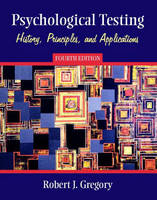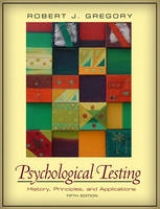
Psychological Testing
Pearson (Verlag)
978-0-205-35472-6 (ISBN)
- Titel erscheint in neuer Auflage
- Artikel merken
The goal of this text is to teach students about the characteristics, objectives, and wide-ranging effects of psychological testing.
In addition to the breadth of coverage of traditional topics, the fourth edition of Psychological Testing provides detailed presentations on neuropsychological and geriatric assessment, the early uses and abuses of testing, assessment of learning disabilities, testing in special settings, race differences in IQ, and cheating on national group achievement tests. The author also describes and critiques the latest versions of the most widely used tests, examines the subtleties of the testing process, and explores the value-laden issues surrounding the wisdom of testing.
Most chapters include “Summary” and “Key Terms and Concepts.”
1. The History of Psychological Testing.
Topic 1A: The Origins of Psychological Testing.
The Importance of Testing.
Case Exhibit 1.1: The Consequences of Test Results.
Rudimentary Forms of Testing in China in 2200 B.C.
Psychiatric Antecedents of Psychological Testing.
The Brass Instruments Era of Testing.
Changing Conceptions of Mental Retardation in the 1800s.
Influence of Binet's Early Research Upon His Test.
Binet and Testing for Higher Mental Processes.
The Revised Scales and the Advent of IQ.
Topic 1B: Early Testing in the United States.
Early Uses and Abuses of Tests in America.
The Invention of Nonverbal Tests in the Early 1900s.
The Stanford-Binet: The Early Mainstay of IQ.
Group Tests and the Classification of WWI Army Recruits.
Early Educational Testing.
The Development of Aptitude Tests.
Personality and Vocational Testing After WWI.
The Origins of Projective Testing.
The Development of Interest Inventories.
Summary of Major Landmarks in the History of Testing.
2. Tests and the Testing Process.
Topic 2A: The Nature and Uses of Psychological Tests.
Definition of a Test.
Further Distinctions in Testing.
Types of Tests.
Uses of Testing.
Case Exhibit 2.1: Test Impact of Nonstandard Testing.
Who May Obtain Tests.
Sources of Information on Tests.
Topic 2B: The Testing Process.
Standardized Procedures in Test Administration.
Desirable Procedures of Test Administration.
Influence of the Examiner.
Background and Motivation of the Examinee.
Issues in Scoring.
3. Norms and Reliability.
Topic 3A: Norms and Test Standardization.
Case Exhibit 3.1: Outmoded Tests and Outdated Norms.
Raw Scores.
Essential Statistical Concepts.
Raw Score Transformations.
Selecting a Norm Group.
Criterion-Referenced Tests.
Topic 3B: Concepts of Reliability.
Classical Theory and the Sources of Measurement Error.
Sources of Measurement Error.
Measurement Error and Reliability.
The Reliability Coefficient.
The Correlation Coefficient.
Computation of the Correlation Coefficient.
The Correlation Coefficient as a Reliability Coefficient.
Reliability as Temporal Stability.
Reliability as Internal Consistency.
Item Response Theory and the New Rules of Measurement
Special Circumstances in the Estimation of Reliability.
The Interpretation of Reliability Coefficients.
Reliability and the Standard Error of Measurement.
4. Validity and Test Development.
Topic 4A: Basic Concepts of Test Validity.
Case Exhibit 4.1: Research as the Essential Proof of Test Validity.
Validity: A Definition.
Content Validity.
Criterion-Related Validity.
Construct Validity.
Approaches to Construct Validity.
Extra-Validity Concerns and the Widening Scope of Test Validity.
Topic 4B: Test Construction.
Defining the Test.
Selecting a Scaling Method.
Representative Scaling Methods.
Constructing the Items.
Testing the Items.
Revising the Test.
Publishing the Test.
5. Intelligence Testing I: Theories and Preschool Assessment.
Topic 5A: Theories and the Measurement of Intelligence.
Definitions of Intelligence.
Case Exhibit 5.1: Learning and Adaptation as Core Functions of Intelligence.
Theories of Intelligence
Topic 5B: Assessment of Infant and Preschool Abilities.
Assessment of Infant Ability.
Assessment of Preschool Intelligence.
Practical Utility of Infant and Preschool Assessment.
6. Intelligence Testing II: Individual and Group Tests.
Topic 6A: Individual Tests of Intelligence.
Orientation to Individual Intelligence Tests.
The Wechsler Scales of Intelligence.
The Wechsler Subtests: Description and Analysis.
Wechsler Adult Intelligence Scale-III.
Wechsler Intelligence Scale for Children-III.
Stanford-Binet Intelligence Scale: Fifth Edition.
Detroit Tests of Learning Aptitude-4.
Kaufman Brief Intelligence Test (K-Bit).
Topic 6B: Group Tests of Intelligence.
Origins and Characteristics of Group Tests.
Multidimensional Aptitude Battery (MAB).
Shipley Institute of Living Scale (SILS).
A Multilevel Battery: The Cognitive Abilities Test.
Culture Fair Intelligence Test (CFIT).
Raven's Progressive Matrices (RPM).
Perspective on Culture-Fair Tests.
7. Test Bias and Testing Special Populations.
Topic 7A: Testing Special Populations.
Origins of Tests for Special Populations.
The Legal Mandate for Assessing Persons with Disabilities.
Nonlanguage Tests.
Nonreading and Motor-Reduced Tests.
Case Exhibit 7.1: The Challenge of Assessment in Cerebral Palsy.
Testing Persons with Visual Impairments.
Testing Deaf and Hard of Hearing Individuals.
Assessment of Adaptive Behavior in Mental Retardation.
Topic 7B: Test Bias and Other Controversies.
The Question of Test Bias.
Social Values and Test Fairness.
Genetic and Environmental Determinants of Intelligence.
Origins of African-American and White IQ Differences.
Age Changes in Intelligence.
Generational Changes in Intelligence Test Scores.
8. Group Tests of Aptitude and Achievement.
Topic 8A: Aptitude Tests and Factor Analysis.
A Primer of Factor Analysis.
Multiple Aptitude Test Batteries.
Predicting College Performance.
Postgraduate Selection Tests.
Topic 8B: Group Tests of Achievement.
Essential Concepts in Achievement Testing.
Educational Achievement Tests.
Special Purpose Achievement Tests.
Cheating: The Dark Side of Achievement Testing.
9. Neuropsychological and Geriatric Assessment.
Topic 9A: A Primer of Neuropsychology.
Case Exhibit 9.1: Brain Dysfunction and Test Results.
Anatomy of the Brain.
Hindbrain.
Midbrain.
Diencephalon.
Limbic Lobe.
Basal Ganglia.
Corpus Callosum.
Cerebral Cortex.
Functions of the Cerebral Lobes.
Specialized Functions of the Right Hemisphere.
Clinical Tests and Brain-Imaging Techniques.
Applications of Neuropsychological Test Findings.
Topic 9B: Neuropsychological and Geriatric Assessment.
A Conceptual Model of Brain-Behavior Relationships.
Assessment of Sensory Input.
Measures of Attention and Concentration.
Tests of Learning and Memory.
Assessment of Language Functions.
Tests of Spatial and Manipulatory Ability.
Assessment of Executive Functions.
Assessment of Motor Output.
Test Batteries in Neuropsychological Assessment.
Case Exhibit 9.2: Luria-Nebraska Neuropsychological Battery.
Assessment of Mental Status in the Elderly.
10. Special Settings for Psychological Assessment.
Topic 10A: School-Based Assessment.
Screening for School Readiness.
Intellectual Evaluation of Preschool Children.
Assessment of Learning Disabilities and Related Disorders.
Case Exhibit 10.1: A Test Battery in Learning Disability Assessment.
Assessment of ADHD.
Assessment of Emotional and Behavioral Disorders.
Testing for Giftedness.
Topic 10B: Forensic Applications of Assessment.
Standards for the Expert Witness.
Evaluation of Suspected Malingering.
Assessment of Mental Status for the Insanity Plea.
Competency to Stand Trial.
Prediction of Violence and Assessment of Risk.
Evaluation of Child Custody in Divorce.
Personal Injury and Related Testimony.
Interpretation of Polygraph Records.
Controversy Over the Psychologist as Expert Witness.
11. Industrial and Organizational Assessment.
Topic 11A: Personnel Assessment and Selection.
A Framework for Personnel Assessment and Selection.
The Role of Testing in Personnel Selection.
Autobiographical Data.
The Employment Interview.
Cognitive Ability Tests.
Personality and Temperament Tests.
Paper-and-Pencil Integrity Tests.
Structure and Measurement of Psychomotor Abilities.
Work Sample and Situational Exercises.
Case Exhibit 11.1: Career Assignment in Canada.
Topic 11B: Appraisal of Work Performance.
Functions of Performance Appraisal.
Approaches to Performance Appraisal.
Sources of Error in Performance Appraisal.
Legal Issues in I/O Assessment.
Case Exhibit 11.2: Unwise Testing Practices in Employee Screening.
12. Attitudes, Interests, and Values Assessment.
Topic 12A: Interests and Values in Vocational Assessment
The Assessment of Life Values.
Inventories for Interest Assessment.
Career and Work Values Assessment.
Integrative Model of Career Assessment.
Consumer Assessment.
Topic 12B: Attitudes and the Assessment of Moral and Spiritual Concepts.
Attitudes and Their Assessment.
The Assessment of Moral Judgment.
The Assessment of Spiritual and Religious Concepts.
13. Origins of Personality Testing.
Topic 13A: Theories and the Measurement of Personality.
Personality: An Overview.
Psychoanalytic Theories of Personality.
Type Theories of Personality.
Phenomenological Theories of Personality.
Behavioral and Social Learning Theories.
Trait Conceptions of Personality.
Topic 13B: Projective Techniques.
The Projective Hypothesis.
A Primer of Projective Techniques.
Association Techniques.
Completion Techniques.
Construction Techniques.
Expression Techniques.
Reprise: The Projective Paradox.
Case Exhibit 13.1: Projective Tests as Ancillary to the Interview.
14. Structured Personality Assessment.
Topic 14A: Self-Report Inventories.
Theory-Guided Inventories.
Factor-Analytically Derived Inventories.
Criterion-Keyed Inventories.
Topic 14B: Behavioral Assessment and Related Approaches.
Foundations of Behavior Therapy.
Behavior Therapy and Behavioral Assessment.
Assessment of Nonverbal Behavior.
Ecological Momentary Assessment
15. Special Topics and Issues in Testing.
Topic 15A: Computer Assessment and the Future of Testing.
Computers in Testing: Overview and History.
Computer-Based Test Interpretation: Current Status.
High Definition Video and Virtual Reality: The New Horizon of CAPA.
Evaluation of Computer-Based Test Interpretation.
Case Exhibit 15.1: Unwise Reliance Upon a Computerized MMPI Report.
Computerized Adaptive Testing.
The Future of Testing.
Topic 15B: Ethical and Social Issues in Testing.
The Rationale for Professional Testing Standards.
Case Exhibit 15.2: Ethical and Professional Quandaries in Testing.
Responsibilities of Test Publishers.
Responsibilities of Test Users.
Case Exhibit 15.3: Overzealous Interpretation of the MMPI.
Testing of Cultural and Linguistic Minorities.
Reprise: Responsible Test Use.
Appendix A. Major Landmarks in the History of Psychological Testing.
Appendix B. Test Publisher Addresses.
Appendix C. Major Tests and Their Publishers.
Appendix D. Standard and Standardized-Score Equivalents of Percentile Ranks in a Normal Distribution.
Glossary.
References.
Index.
| Erscheint lt. Verlag | 5.9.2003 |
|---|---|
| Sprache | englisch |
| Maße | 195 x 243 mm |
| Gewicht | 1274 g |
| Themenwelt | Geisteswissenschaften ► Psychologie ► Test in der Psychologie |
| ISBN-10 | 0-205-35472-6 / 0205354726 |
| ISBN-13 | 978-0-205-35472-6 / 9780205354726 |
| Zustand | Neuware |
| Informationen gemäß Produktsicherheitsverordnung (GPSR) | |
| Haben Sie eine Frage zum Produkt? |
aus dem Bereich



